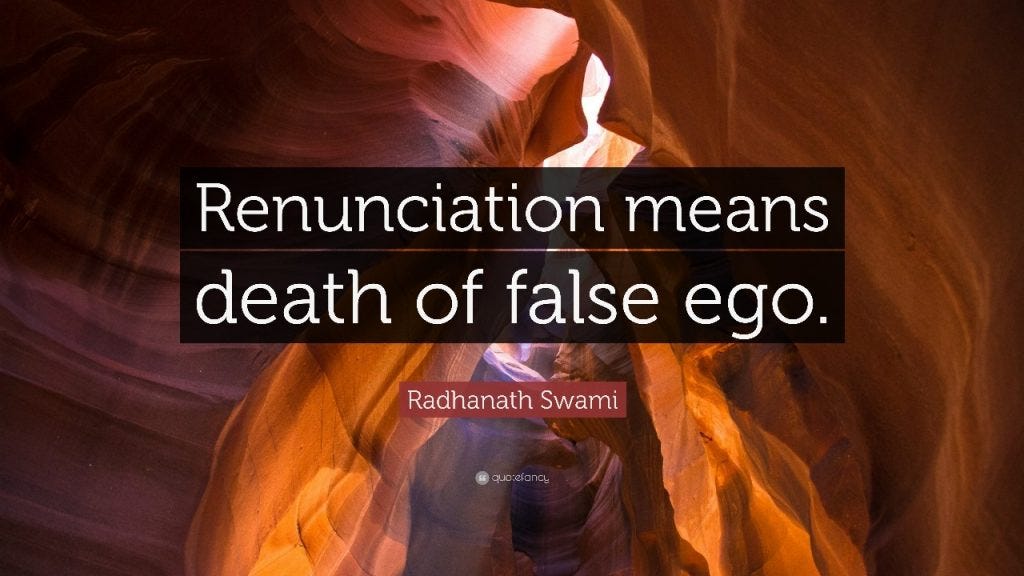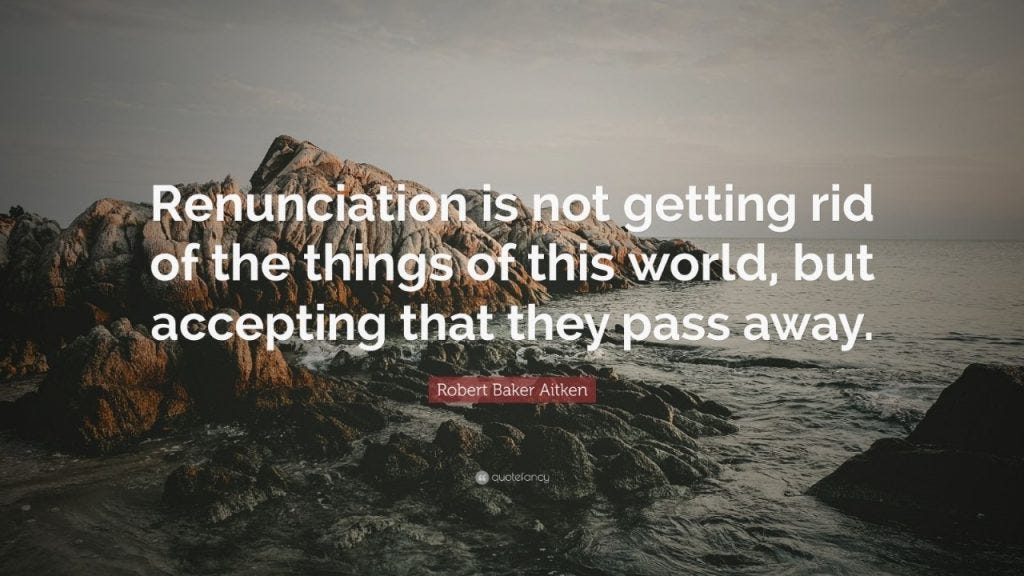In the teachings of Buddhism, renunciation and surrender play pivotal roles in the spiritual journey towards awakening. Rooted in the fundamental principles of letting go and acceptance, these concepts offer profound insights into the nature of suffering and liberation. In this article, we will explore what renunciation and surrender mean in the context of Buddhism, delve into the wisdom of the Buddha on these subjects, discuss their importance in spiritual growth, identify what we need to surrender, and offer practical practices for cultivating these qualities in our lives.
Renunciation and surrender in Buddhism refer to the act of letting go of attachments, desires, and clinging to transient phenomena in order to attain liberation from suffering. Renunciation involves a conscious decision to turn away from the pursuit of worldly pleasures and material possessions that bind us to the cycle of birth, old age, sickness, and death. Surrender, on the other hand, entails relinquishing the illusion of control and embracing the impermanent nature of existence with humility and acceptance.
The Buddha emphasised the importance of renunciation and surrender as essential components of the Noble Eightfold Path, the path to liberation from suffering. In one of his discourses, the Buddha said, “Letting go gives us freedom, and freedom is the only condition for happiness. If, in our heart, we still cling to anything—anger, anxiety, or possessions—we cannot be free.” This profound teaching underscores the transformative power of renunciation and surrender in overcoming the causes of suffering and attaining inner peace.
Renunciation and surrender are crucial in Buddhism because they serve as antidotes to the roots of suffering, namely craving, aversion, and ignorance, known as the three poisons. By letting go of attachments and surrendering to the natural flow of life, practitioners can cultivate a sense of inner peace, contentment, and equanimity. These qualities are essential for breaking free from the cycle of suffering and realising the ultimate goal of an awakened mind.
In order to cultivate renunciation and surrender in our lives, we need to let go of various mental and emotional obstacles that hinder our spiritual growth. Some common things that we need to surrender include:
1. Attachment to material possessions: We should cultivate a sense of non-attachment towards material wealth and possessions, recognising that true happiness does not depend on external circumstances.
2. Ego and self-identity: Surrendering the ego involves letting go of the illusion of a fixed self and embracing the interconnected nature of all beings.
3. Grasping onto desires: By releasing our attachment to desires and expectations, we can experience greater freedom and contentment in the present moment.
These are the things we need to work on. So, now let’s look at practical practices for cultivating renunciation and surrender:
1. Meditation is a powerful practice that allows you to observe your thoughts, emotions, and attachments without judgment. Through regular meditation, you can develop a heightened awareness of your mental patterns and tendencies. By observing these patterns, you can begin to see how your attachments and clinging to certain thoughts or emotions may be causing you suffering. With this awareness, you can gradually learn to let go of unhelpful attachments and cultivate a sense of inner peace and freedom.
The practice of meditation helps you build a space between your thoughts and your reactions, allowing you to respond to situations more mindfully rather than reacting impulsively. By cultivating this awareness, you can gain greater control over your mind and emotions, leading to a more balanced and centred way of being.
2. Practicing gratitude involves cultivating a sense of appreciation for the present moment and the blessings in your life. When you focus on what you have rather than what you lack, you shift your perspective towards contentment. Gratitude can help you develop a positive outlook on life and foster feelings of joy and satisfaction.
By regularly acknowledging and expressing gratitude for the good things in your life, you train your mind to notice and appreciate the positive aspects of your experiences. This mindset shift can lead to increased happiness, improved relationships, and a deeper sense of fulfilment.
3. Simplifying your life involves decluttering your physical space and streamlining your lifestyle to reduce distractions and attachments. By clearing out unnecessary possessions, commitments, and activities, you create more space for what truly matters to you. Simplification can help you focus on your priorities, reduce stress, and enhance your overall well-being.
When you simplify your life, you free yourself from the burden of excessive material possessions and obligations. This process can lead to greater clarity, increased productivity, and a sense of lightness and freedom. By letting go of what no longer serves you, you create room for growth, creativity, and new opportunities.
4. Non-attachment is the practice of observing challenging situations or difficult emotions without clinging or aversion. When you encounter obstacles or negative feelings, instead of identifying with them or trying to push them away, you allow them to arise and pass away naturally. By practicing non-attachment, you cultivate a sense of detachment and spaciousness that enables you to respond to life’s ups and downs with equanimity.
Non-attachment does not mean suppressing emotions or avoiding difficult situations. Rather, it involves acknowledging and accepting your experiences without getting swept away by them. By developing this skill, you can navigate adversity with resilience and grace, knowing that everything is impermanent and transient.
5. Engaging in acts of generosity involves sharing your time, resources, and kindness with others without expecting anything in return. By practicing generosity, you cultivate a sense of compassion, connection, and abundance. Giving to others not only benefits them but also brings joy and fulfilment to your own life.
Generosity can take many forms, from volunteering at a local charity to offering a listening ear to a friend in need. When you give without attachment to outcomes, you experience the joy of making a positive impact on others’ lives. Acts of generosity can foster a sense of interconnectedness and community, enriching both your life and the lives of those around you.
7. Seek guidance from spiritual teachers: Connect with wise and experienced spiritual teachers who can offer guidance and support on your path of renunciation and surrender. Their insights and teachings can inspire you to deepen your practice and cultivate these qualities more effectively.
Renunciation and surrender are essential aspects of the Buddhist path that offer profound insights into the nature of suffering and liberation. By letting go of attachments, desires, and the illusion of control, practitioners can cultivate inner peace, contentment, and wisdom. Through practical practices such as mindfulness, meditation, gratitude, and non-attachment, individuals can deepen their understanding of renunciation and surrender and apply these teachings in their daily lives. By embodying these qualities with sincerity and dedication, one can progress on the path towards awakening and experience the profound freedom that comes from letting go.
If you would like to become a supporter of Buddhism Guides work, such as podcasts, blogs, videos and guided meditation practices, please visit here. You can support for as little as $2 a month.





Insightful post, Yeshe Rabgye delves into the profound Buddhist concepts of renunciation and surrender. He explains how these practices help individuals let go of attachments, desires, and the illusion of control to attain liberation from suffering. Rabgye emphasizes the importance of meditation, gratitude, simplifying life, non-attachment, and generosity as practical steps to cultivate these qualities. This guidance provides a pathway for deeper spiritual growth and inner peace.
Regards,
Antique Buddhas
https://buddhastatuen.eu